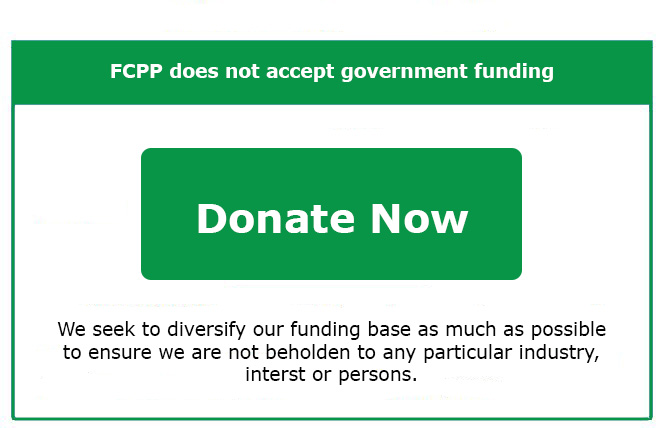Censorship is typically considered to be the removal or blocking of information, speech, or expression. It includes self-censorship, which is when individuals or organizations limit what they say for fear of repercussions. Historically, repressive governments have often shut down or silenced media sources, legislation has prevented journalists from freely reporting the truth, and those who did speak out were imprisoned or killed. In Canada, censorship is more often subtle than overt. It can take the form of muzzling scientists, refusing activists entry into Canada, book seizures at the border, and libel chill. The common denominator is that free voices are silenced.
Free expression and press freedom in Canada face bigger threats than ever. Journalists are unable to protect their confidential sources, public interest stories are not told, reporters are removed from prime ministerial media scrums, and journalists lose their jobs for publishing pieces that criticize government policy. National security agencies have greater access to our private data than ever before, without any oversight to protect our rights. Many journalists are routinely spied upon by police.
Censorship has followed the free expression of men and women like a shadow throughout history. The origin of the term “censor” is traced to the office of censor created in ancient Rome, around 443 BC. Just as in ancient Grecian communities, the Roman ideal of good governance included shaping the character of the people. Censorship was thus regarded as an honourable task. In China, the first censorship law was made over 1,700 years ago, and it is still a basic feature of Chinese society today.
Socrates was famously sentenced to drink hemlock in 399 BC for his alleged corruption of youth in Athens. He was likely not the first person executed for violating the moral and political codes of his time. This ancient view of censorship, as a benevolence to protect the public, is still upheld in many modern nations, including Canada, where social media shaming and other new forms of censorship are proliferating via technology and global connections. The struggle for freedom of expression is as ancient as its counterpart, censorship. The playwright Euripides (circa 484-406 BC) defended the true liberty of free-born men to speak freely, but also recognized that doing so was a matter of individual choice.
Free speech was a challenge for pagan rulers, but was no less so to the guardians of Christian orthodoxy. To defend an heretical threat to Christian doctrine, the Church introduced measures such as the Nicene Creed, promulgated in 325 AD. This profession of faith is still widely used in liturgy today. As more books were written and copied and ever more widely disseminated, ideas perceived as subversive and heretical were spread beyond the control of the rulers. Consequently, censorship became more rigid, and punishments more severe.
The invention of the Gutenberg press in the mid-15th century only increased the need for censorship. Although printing greatly spread the Catholic mission, it also aided the Protestant Reformation and heretics such as Martin Luther. Thus suppression of the printed word became a religious and political battleground.
Just as the printing press was vital to spreading knowledge, the establishment of a regular postal service was an equally important advancement to communication. The first postal service in France was established in the late 18th century, and it soon became the most widely used system of both personal and international communication. It therefore also came to play a crucial role as an instrument of censorship, particularly during wartime. The British Empire efficiently censored mail during the first half of the 20th century. Even today, the postal service remains a tool of censorship in many countries.
The rapid growth of newspapers was a hugely significant innovation for the literate peoples of Europe. But it also increased the state concern that unlimited access to information would be harmful to society and public morals, especially during war or other crises. The Enlightenment of the 17th and 18th centuries was a time of reason in Europe. The rights, liberty, and dignity of the individual became political and then legal issues in many countries. Sweden was the first to abolish censorship and pass a law guaranteeing freedom of the press in 1766. Other Scandinavian nations soon followed suit. In 1787, the First Amendment of the American Constitution guaranteed freedom of the press and is regarded as the root of comprehensive freedom of expression in the Western world.
In the 18th century, the press in most of Europe was subjected to strict censorship, but the 19th century saw the emergence of an independent press. The first Japanese daily newspaper appeared in Yokohama in 1870, at a time when arrests of journalists and suppression of newspapers were commonplace. Although government censorship had been largely abandoned in most Western countries during the 19th and 20th centuries, public intolerance of offensive literature did not disappear. One of the most stunning examples is Mark Twain’s classic, The Adventures of Huckleberry Finn. It was first banned in 1885, but was still in peril of censorship in 1984. Today, it has been removed from high school and college curricula for its bald representation of a Black slave in the deep South. 
The Russian empire had a long tradition of strict censorship and was slow to adopt changes that Central European nations had made a century before. October 1917 brought a long and extensive era of strict censorship under the revolutionary rulers of the USSR, which lasted until the end of the 1980s. The Soviets also imposed strict censorship on all occupied nations and satellite states, many of which had been subject to the censorship of imperial Russia.
In 1933, over 25,000 offensive books were burned in Germany. The famous Ray Bradbury novel, Fahrenheit 451, later dramatized this concept in a dystopian America in which firemen are hired by the state to burn books that have been secreted away by citizens, just as sympathizers hid Jews from the Nazis during the Second World War. Hitler, the omnipotent leader of the Third Reich, also implemented the severe censorship and oppressive propaganda machine of the Nazi regime in all nations that were under German occupation. In all such countries, national newspapers, publishing houses, and radio stations were taken over at once or shut down, while radios were confiscated. As German poet and literary critic Heinrich Heine observed during the Nazi era: “Where books are burned, in the end, people will burn.”
Throughout history, the media have always been the first victims in times of war. As a rule, the press has been faced with a choice between gagging or closure. Many respected newspapers were simply taken over by a country’s new rulers, or forced to become their mouthpiece. In 1948, when signing the Universal Declaration of Human Rights, the members of the newly formed United Nations pledged to remember the millions murdered in Nazi Germany. Despite this, in full view of the media-saturated international community, history repeated itself in the former Yugoslavia in the 1990s, in Rwanda in 1994, and in modern-day China.
Should Canadians worry about censorship?
Leighton Grey is a senior fellow at the Frontier Centre for Public Policy.
Photo by Kristina Flour on Unsplash.



